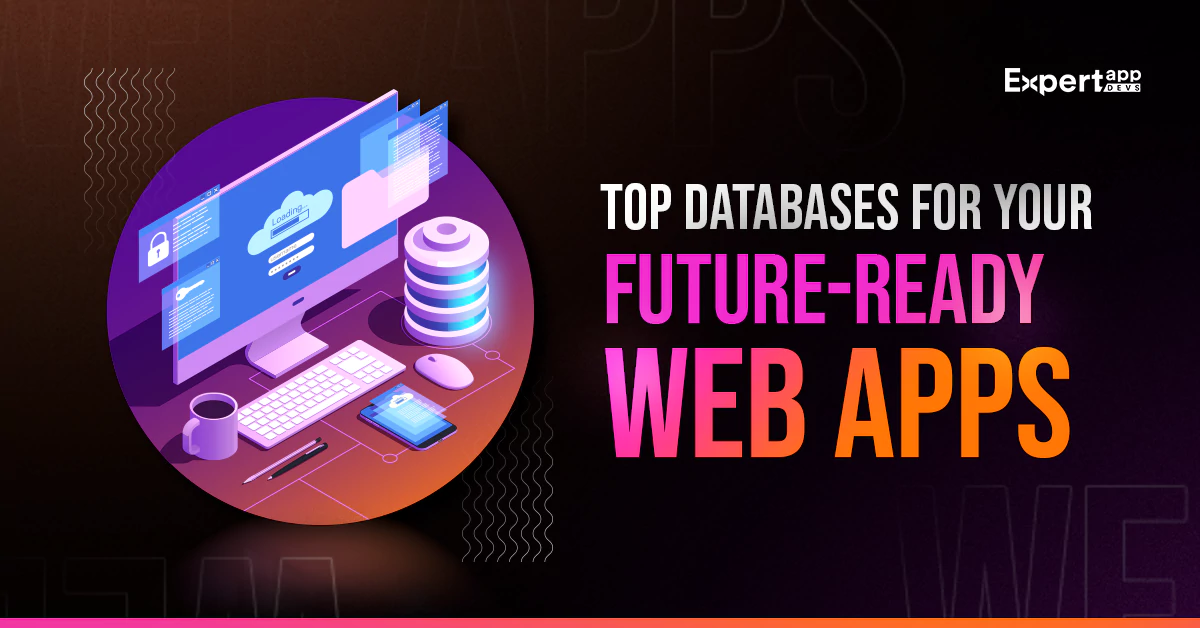5 Best Databases for Your Future-ready Web Applications
Can you believe it’s been years since we used a landline-only mode of communication? Can you even think of going back in time and being happy with the landline? Technology disruption is real. Traveling back and living without the advancements isn’t possible.
That’s why most businesses are ready to say bye or update their legacy systems. Working with them is impossible owing to the cost indulgence, extra work and increased risks associated. More businesses are looking to embrace future-ready web applications that give convenience, increased reach and better customer conversions.
It can help enterprises succeed in their endeavor to connect with customers, engage them on a platform and increase sales. The database is core to the business applications. It stores information, enhances real-time access, and improves communication. When the customer enters an input, the backend will search the database for the proper output.
A robust database will enhance real-time data movement and ensure minimal delays. When you invest in a good database, you improve data integrity and data security. It contributes to the success and growth of your business.
This guide will introduce the web app database and the top five you must consider for your futuristic applications.
What is a Web App Database?
Every software solution comprises a database. The database is where your data is structured, organised and stored for access. It can handle large volumes of structured and unstructured data. The database is responsible for structuring and overall access to the data.
The data stored within the database also includes the code, rendering processes and other essential elements. It can help improve the data movement from and to the application.
In the case of the web application, the data is accessed via the web browsers. The point of access and user communication is different in future-driven web applications. The web app database will store all the information pertaining to the user. It will also store the content on the application, backend information and data movement.
Let’s look at the top benefits of using a web app database for your solution.
Top 5 Benefits of Using Database
Every application developer recommends housing a database for your web application. There are certain benefits associated with this.
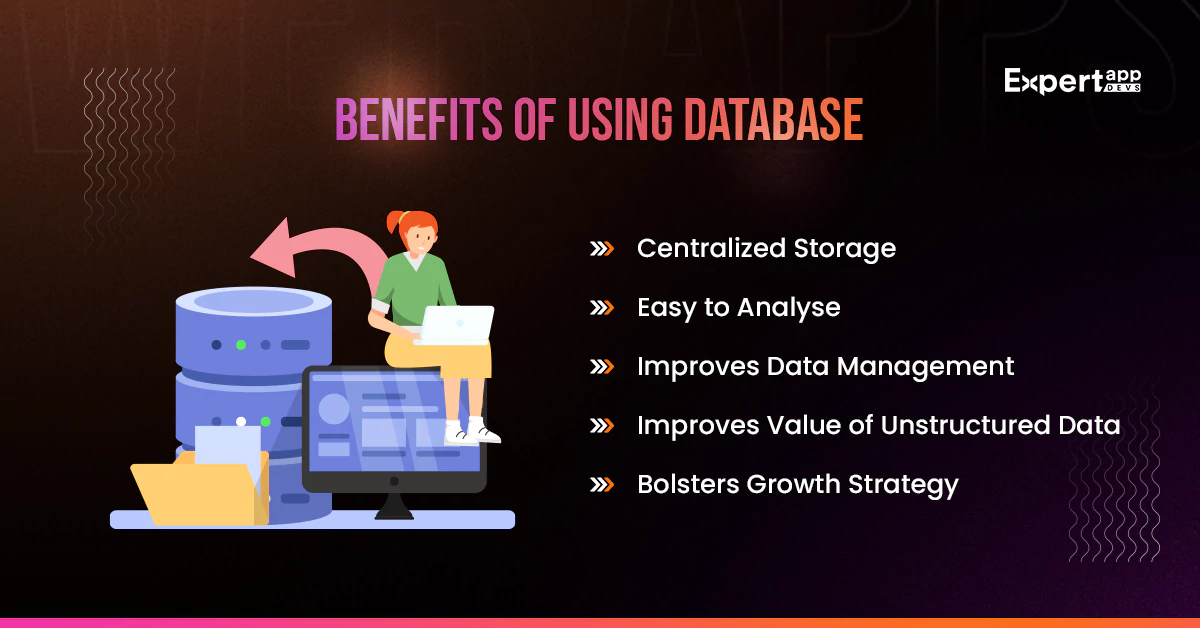
#1 Centralized Storage
You can access all the information related to your business from a single location. Centralized storage makes accessing, retrieving and securing critical data convenient. It can improve data space management and enhance productivity. Whether using Flutter for web or other frameworks, the centralized storage can increase the app's ability.
#2 Easy to Analyse
You can easily analyse the important data for your business from a single place. It allows you to interpret the data using multiple techniques and methods critically.
#3 Improves Data Management
Data movement and structuring are essential for better access and quick movement. However, with the database, you may be able to assemble the data in a single place. It would be difficult to keep track of the data and send it to the users on time. That’s why databases can help businesses improve data management.
#4 Improves Value of Unstructured Data
You may only sometimes get information or data in a structured format. Interpreting and making the most of the unstructured data available is important. It can improve the overall value of the data. You will also get some insights from unstructured data that can help enhance business growth.
#5 Bolsters Growth Strategy
When you have relevant data in your database, it can help improve the insights for your business. Eventually, you will get the insights and recommendations to improve decision-making.
You can plan well for your business growth using these recommendations. A good database can easily accommodate with your tech stack. For instance, if you plan to use React Native for web, your database will automatically integrate.
Let’s look at all the different types of databases that are available.
The Different Types of Databases
Five main types of databases can be used to build your future-ready web applications.
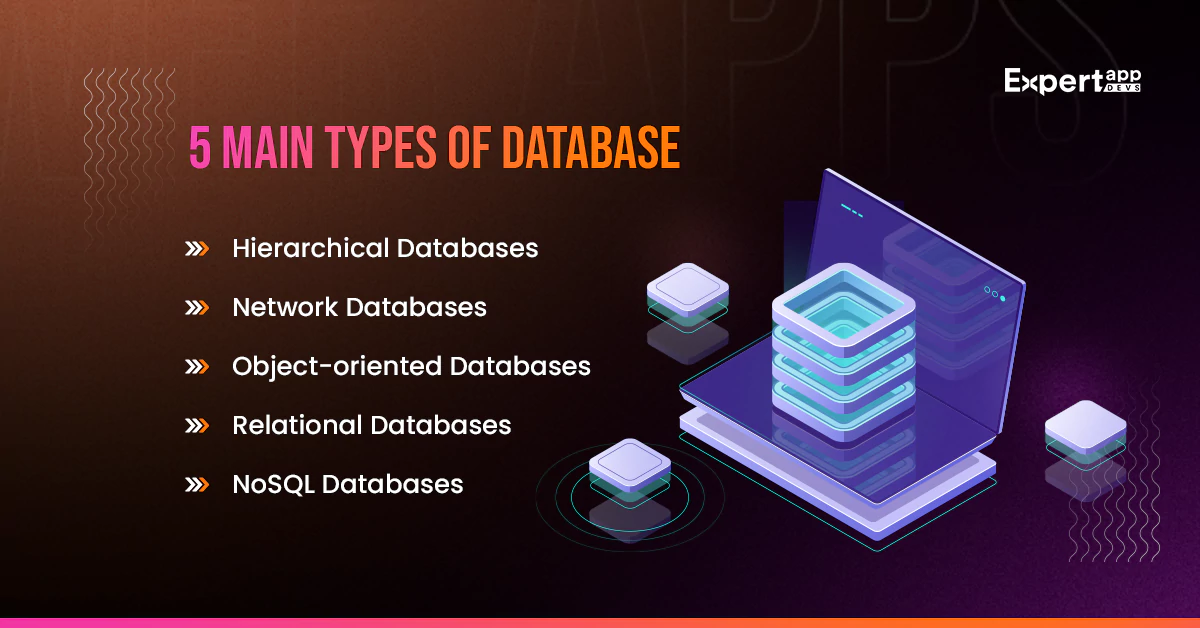
#1 Hierarchical Databases
The data will follow a hierarchy of ranks pre-determined by the particular business or place. For instance, in the case of an enterprise, the governing factor would be the people's role in the organization. The managerial data would be different from the CEO’s data.
There would be a common element linking the databases. This would lead to building the hierarchy.
#2 Network Databases
This is more like a collaborative database. The child database can collaborate with multiple parent databases. This is a more complex database format as there are multiple linkages. They can get complex if you have not determined a simpler concept.
#3 Object-oriented Databases
This is majorly used in Object-oriented Programming. The information or data present in the database is regarded as an object. As a result, retrieving the information or calling it in real-time is easy and efficient.
#4 Relational Databases
This is a mature database format. In this case, it is observed that every object or information has some relationship with the other data. The data is available in tabular format in this database. The tables in the database are mutually linked using the key.
#5 NoSQL Databases
They are also known as non-relational databases. This database offers a mechanism that improves the storage and retrieval of the data.
You can easily gather information using different formats in this database. It is simple and extends abilities toward horizontal scaling. It offers high stability, availability and scalability.
The Top 5 Popular Databases for Web Apps
We have seen the benefits of using databases and the different types that exist. Look at the top five databases you can include in your future-ready web applications. These databases can add value to your software solutions.
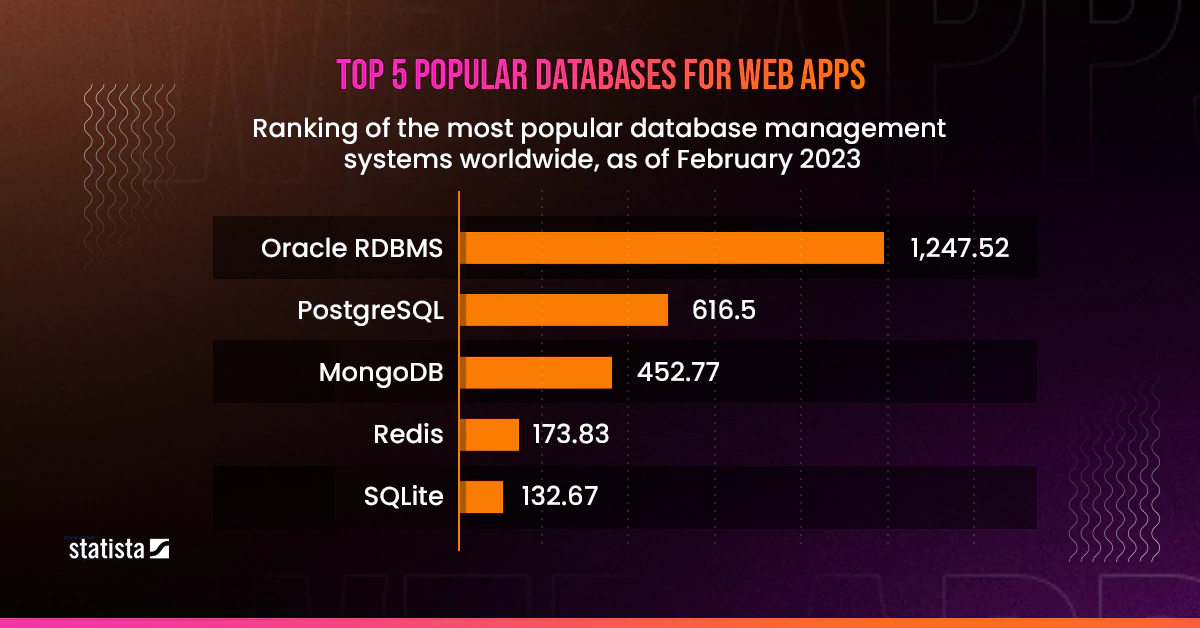
1. Oracle RDBMS
Oracle RDBMS (Relational Database Management System) is popular for its ease of use and organisation. It is designed to provide enterprise-grade computing combined with data warehousing. It works with SQL data queries to enhance the data structures and improve accessibility.
There are various editions of the Oracle database structure that you can implement for ease of access. You can choose from on-premise, cloud-based and hybrid cloud implementation solutions.
The Key Features
- It is a cross-platform database that can easily be accessed via different operating systems, including Windows, Unix and others.
- The networking stack allows Oracle to communicate with applications across platforms easily.
- It uses the logical data structure to enhance data interactions and improve its communication abilities.
- With memory caching, you can scale the databases at a high speed
Pros and Cons
|
Pros |
Cons |
|
Reduces the operational costs |
High cost, including licensing fees |
|
A single database for multiple data variants |
Steep learning curve |
|
Excellent backup and recovery management |
|
|
Excellent scalability and extensibility available |
2. PostgreSQL
This is a type of relational database where the structure is fully defined. You will get the data in a tabular format. Also known as Postgres, this is an open-source and extensible database application.
The PostgreSQL database is known to be reliable and robust. It supports JSON querying ( a non-relational method) and SQL (more relational) methods. As it has existed for over 20+ years, it offers great stability to web app developers.
Moreover, it is backed by a strong community that ensures quick resolutions and strong functions. The biggest benefit is that it can support multiple data structures and types.
The Key Features
- It offers a more sophisticated locking mechanism, which ensures that users cannot modify the contents of the application.
- Postgres offers the ability to cluster the key for better security.
- The ACID compliance in this database management software is stricter than most other databases.
- It extends support to asynchronous replication. This means if the primary fails to record the data, the secondary will automatically replicate it.
- Multi-version concurrency control (MVCC) is the most crucial feature of Postgres. It ensures that the transactions are controlled and easy, even in a multi-user environment. In case of multiple transactions, the database will not stop functioning.
Pros and Cons
|
Pros |
Cons |
|
It is very easy to use |
It doesn’t comply with the performance requirements |
|
The data type is defined according to the users |
Less popular among web app developers |
|
Extensive community support is available |
Requires expert database management team to leverage the features |
|
Supports ACID compliance |
Replication of data can add to the complexities. |
The database can handle large datasets and complex queries, so it can be useful in building enterprise-grade applications. It can also help in distributing the data among multiple servers.
3. MongoDB
MongoDB is a scalable and available document database. It offers the flexibility that you need with querying or accessing. You can easily index the information on the database with this tool.
You can use it to build scalable web applications with future-ready features. It offers a horizontal architecture that can be easily extended. The developer community is strong and impressive for this database.
The document database doesn’t store in rows/columns format; it uses binary data representation. You can easily store structured and unstructured data using this database.
The Key Features
- It uses a document model to store and retrieve information, which can enhance modern applications.
- You can create the indices on-demand, which improves real-time data exchange and enhances querying.
- You can use the replication model for better data availability or querying.
- It is a fully scalable database architecture that simultaneously handles large datasets and traffic.
Pros and Cons
|
Pros |
Cons |
|
Extends high-speed performance |
Relies on good indexes for the work |
|
Supports ad-hoc queries that enhance real-time communication |
Consumes a large amount of memory |
|
Uses sharding to manage high data volumes easily |
Limits the data size to 16MB |
|
Flexible and always available |
4. Redis
This is an in-memory data store. Developers can reconstruct it and use it as a database or in-memory store for web applications. Depending on the application's needs, it can also be used as a streaming engine, cache memory, or message broker.
The database store supports various data structures, including strings, lists, maps, and sets. Redis comes with in-built replication. You will also get LRU eviction and transactions with this data store. You can run multiple atomic operations on this data store.
This is easily compatible with a large number of programming languages.
The Key Features
- All the data is stored in the main Redis data memory instead of the SSDs and other memory disks.
- The primary-replica architecture that you get with Redis allows you to build available and scalable applications.
- You can easily scale the Redis database horizontally as well as vertically.
- The saved data will remain through all the data loss and server issues. You will never lose the data saved to the core memory.
- It offers extensive and rich data structures.
Pros and Cons
|
Pros |
Cons |
|
Can handle high volume and large transactions |
It may not support certain extensive data types |
|
Easy to use and implement |
The core database structure may not be easy to interpret |
|
Easy and reliable multi-tenant data usage |
The memory requirements are very high |
|
High cache speed available |
5. SQLite
This is a database engine that was created using C language. SQLite is a part of the embedded database family. You cannot use it as a standalone application or as a library in your web app. It can help improve data movement and access in large-scale applications.
You can easily program or introduce the database management system without an administrator using this database.
It is a form of relational database that can be easily implemented in your web application. It is also one of the most popular formats. It can easily manage low-to-high HTTP requests. The data from this database is stored within the user’s phone in text-only format.
The Key Features
- It is a serverless database, which means you don’t need a server, process or system to retrieve information.
- It is a simple and easy-to-use database system.
- The execution time is fast and impressive. You will note it is faster than direct execution methods.
- You will notice that it has minimal external dependencies.
- The transactions are ACID-compliant.
- It can support terabyte-sized databases.
Pros and Cons
|
Pros |
Cons |
|
It is lightweight. It can be easily embedded into the devices |
Can handle only low-to-medium HTTP requests |
|
It offers excellent application performance as the speed of access is high |
Restricted database size |
|
Easy to learn with zero installation requirements |
|
|
Updates data with minimal to zero data crash |
|
|
Can be easily transferred across devices |
As a beginner app developer, you can easily get started with this database. It also ensures there is no backward compatibility.
We have seen how database management systems can enhance the project’s abilities. Let’s look at how you can choose the right database solution for your future-ready web application.
How to Choose the Right Database Solution for Your Web App Project?
When you start a web app project, there are several things you ought to consider. The database is core to smooth application development. Here are all the factors to consider when looking for the best database for web applications.
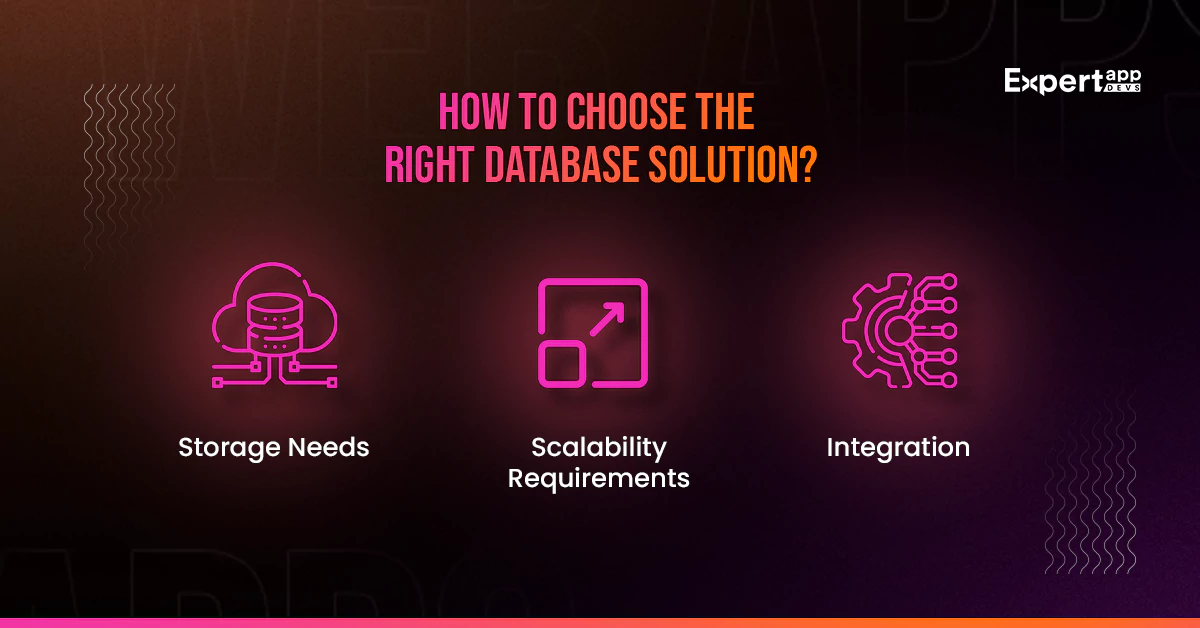
#1. Storage needs
The storage needs differ for the different types of projects. For instance, if you need a more relational database, you must look for a SQL-type structure. Redis might be helpful if you want to handle large data volumes. If you need a data engine, you must look for a database to support your needs.
Depending on the storage, access and querying requirements, you must look for a database solution. It can help accelerate your web app project.
#2. Scalability Requirements
As the business grows, the data requirements grow. You will notice that your business has many transactions with the new sales pipeline and channels. However, your database needs to match your scalability needs.
That’s why you must look for a database that ensures immediate scaling and quick availability. It would enhance your growth prospects. There are various types of scaling, including sharding and horizontal scaling.
Choose a database that suits these needs perfectly.
#3. Integration
If you are working with a particular programming language, you must ensure the database integrates perfectly. Choosing a database solution that makes integration quick and easy is important.
Look for integration supporting documents that can enhance the usability of the database solution.
Conclusion
Database systems are crucial to web app development. It can help you prepare the application for extensive volume data handling and transactions. It can enable real-time data transfer and interactions.
It is essential to choose a reliable and suitable database system for the web application needs. Expert App Devs have a good understanding of database management systems. We have worked with relational and non-relational databases and enhanced application management. Connect with our team to choose and implement a robust and reliable system.
 Vaibhav Patel
Vaibhav Patel
